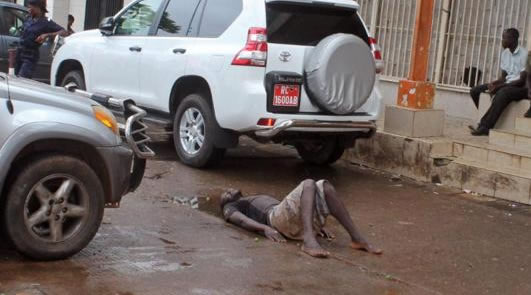Health authorities warn against complacency

 The Ministry of Heath is warning Liberians to avoid complacency in the wake of the reported decrease in the deadly Ebola virus across the country.
The Ministry of Heath is warning Liberians to avoid complacency in the wake of the reported decrease in the deadly Ebola virus across the country.
According to the Health Ministry, celebrating the decrease of the Ebola virus is meaningless, particularly with the rampant spread of the virus in neighboring Guinea and Sierra Leone.
The Ebola virus has devastated the economies of Liberia, Guinea, and Sierra Leone – the three highly hit countries in the entire region with the death toll combined registering over 5,000 including health care workers, nurses and doctors placed in the frontline to confront the virus.
Health authorities here had reported a decrease in the virus in the entire country with recent statistics putting the total infection cases at 400, a pronouncement that has sent many Liberians jubilating while the government itself is gearing up to conduct senatorial election in December despite the closure of schools and the presence of skeleton staff in public offices as part of measures taken earlier to halt the spread of the disease.
Speaking Tuesday, 4 November during a daily press briefing at the Ministry of Information, Cultural Affairs and Tourism in Monrovia, the Assistant Minister of Health for Statistics and head of Contact Tracing, Sanford Wesseh, warned that if citizens begin to celebrate news of a drop in the infection rate then the country is heading nowhere, adding, “We must all work in collaboration to ensure that the virus leaves the three West African countries, because if Liberia becomes free from this virus, without Guinea and Sierra Leone then it’s still difficult.”
Minister Wesseh noted that one of the best ways to eradicate the virus quickly from Liberia is for every citizen to join hands by carrying on their own contact tracing in the various communities, making sure that every isolated areas and quarantine centers are well taken care of and to ensure suspected patients don’t leave from the treatment centers to make contact with people in the communities.
He says if there is no proper care for patients, or people who are isolated, there would be lot of new cases, “because you cannot isolate people without feeding them, and providing them with the necessary things that they need.” According to the Assistant Health Minister, the idea of catering to people who are being quarantined is to stop them from making additional contacts which will cause the virus to spread further.
[bsa_pro_ad_space id=1]
He narrated that there is a difference between case and contact tracing, adding that contact tracing is to follow people who may have come in direct contact with the body fluid of a suspected person, while case is someone who shows signs and symptoms of the virus.
Assistant Minister of Health for Preventive Services, Tolbert Nyenswah has also warned that no county in Liberia is Ebola-freed. Minister Nyenswah noted that many citizens were of the belief that their respective counties are free of Ebola so they were still carrying on their traditional practices, including bathing and burying dead bodies.
Minister Nyenswah said about a week now there has been no new case among healthcare workers across the country, saying that since 3 November Liberia has had 39 new cases including suspected, probable and confirmed cases.
He noted that nationwide, there are about 200 patients presently in various Ebola Treatment Units or ETUs, adding that there has been decline in new cases in Lofa, and other counties that were seriously hit at the onset of the Ebola outbreak. He said the Government in collaboration with foreign partners has increased the number of bed spaces in the various ETUs so that people can immediately report themselves whenever they are sick.
The Assistant Health Minister, who also heads the Government’s Incidence Management System, said most people in various communities feel sick, but are afraid to report to the hospital because of limited bed space.
He warned that a single case of unsafe burial could cause an entire community to get infected, and disclosed that several counties, including Grand Bassa, Gbarpolu, Grand Gedeh and Maryland do not have ETUs when they should be able to fight their own cases instead of bringing patients to Monrovia at the risk of long distances and bad roads.















